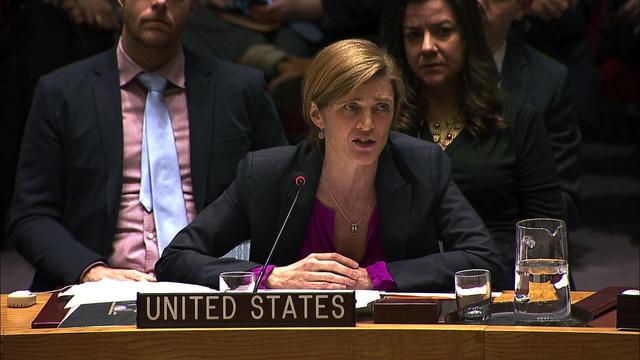Politics
 cbsnews1.cbsistatic.com/hub/i/r/2016/12/23/b3bbb8f9-fcc6-49a2-b9a2-f3055647af4b/thumbnail/1280×720/3f54acebe7af80123c4cde7a16ffa492/un-securitycouncil.jpg 2x” class=”” style=”max-width: 100%; margin: 0.5em auto; display: block; height: auto;”>
cbsnews1.cbsistatic.com/hub/i/r/2016/12/23/b3bbb8f9-fcc6-49a2-b9a2-f3055647af4b/thumbnail/1280×720/3f54acebe7af80123c4cde7a16ffa492/un-securitycouncil.jpg 2x” class=”” style=”max-width: 100%; margin: 0.5em auto; display: block; height: auto;”> The Obama administration’s decision to not veto a United Nations resolution sharply critical of Israeli settlements continues to stir debate. But was it really all that different than prior U.N. resolutions that criticized Israel that the U.S. let pass?
The U.N. resolution condemning Israeli settlement activity passed the Security Council last week after the U.S. declined to use its veto power to stop it. Samantha Power, the U.S. ambassador to the U.N., instead cast the sole abstaining vote. All other nations on the Security Council voted in favor.
The resolution called for Israel to “immediately and completely cease all settlement activities in the occupied Palestinian territory, including East Jerusalem.”
East Jerusalem, which contains some of the holiest sites in Judaism, was seized by Israel in the Six-Day War of 1967. In a speech before the chamber, Power insisted that her vote did “not in any way diminish the United States’ steadfast and unparalleled commitment to the security of Israel.”
Conservatives and pro-Israel advocates say the resolution signals a major and damaging reversal of U.S. policy in the region. “The White House has abandoned any pretense that the actual parties to the conflict must resolve their differences,” John Bolton, the former U.S. ambassador to the U.N., wrote in the Wall Street Journal on Monday.
But Democrats have argued that conservative criticisms of the White House are unwarranted. As political consultant Mark Mellman pointed out on Twitter, for example, previous administrations have declined to exercise veto powers when it comes to resolutions critical of the Israelis.
Not 1st time US allowed anti Israel res @UN…
Under…
LBJ 7
Nixon 15
Ford 2
Carter 14
Reagan 21
GHWB 9
WJC 3
GWB 6
BHO 1— Mark Mellman (@MarkMellman) December 23, 2016
“Acting like this is some brand new policy or action just isn’t consistent with reality,” Mellman, who believes the decision to allow the resolution was wrongheaded, told CBS News. “Right or wrong, good or bad, since 1967 American policy has been that the West Bank, including East Jerusalem, and Gaza are occupied territories whose final status must be determined by the parties. And the U.S. has consistently opposed Israel’s settlement policy.”
Critics of the resolution argue that it’s been decades since the U.S. allowed a U.N. resolution to pass that says East Jerusalem and other lands taken in the 1967 war are occupied Palestinian territory. Previous resolutions the U.S. allowed to pass have instead tended to condemn specific actions of Israelis or the Israeli government, such as the bombing of an Iraqi nuclear reactor in 1981.
In another example, a U.N. resolution condemning the 1994 massacre of Muslim worshipers by a Jewish terrorist was passed only when Madeleine Albright, then the U.S. ambassador, demanded a paragraph-by-paragraph vote on it to strip out language implying that Jerusalem was occupied territory.
“[W]e oppose the specific reference to Jerusalem in this resolution and will continue to oppose its insertion in future resolutions,” Albright said at the time.
“We simply do not support the description of the territories occupied by Israel in the 1967 war as ‘occupied Palestinian territory,’” Albright said. However, the U.S. does not recognize Israeli claims to East Jerusalem either.
Albright’s comments run counter to a 1980 U.N. resolution – supported by the U.S. – that did refer to Jerusalem and other lands taken by Israel in 1967 as occupied territory. But that position was in a sense reversed by Albright’s comments in 1994.
“It’s true the U.S. has not allowed a U.N. Security Council resolution to that effect to pass since 1980, but U.S. policy has been consistent under every Democratic and Republican administration to date. Moreover, the U.S. has allowed other anti-Israel resolutions to pass on a number of occasions before and after 1980. President Obama was the first president to adopt a policy of vetoing all anti-Israel U.N.S.C. resolutions – until now,” Mellman said.
“So not vetoing this resolution is a bit of a punch in the gut, but not a very hard one. It is in no way a change in U.S. policy about the conflict.”
